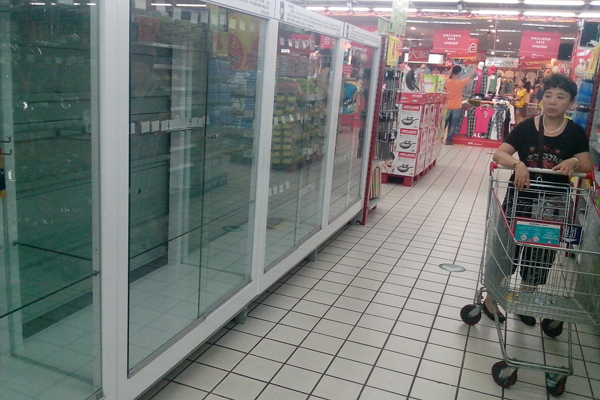Retailer pulls knives after fatal attack
Several Beijing supermarkets have removed knives from their shelves after an attack at a Carrefour store on Monday.
The 50-year-old suspect, surnamed Wang, allegedly stabbed four people with a knife measuring 20 centimeters in length at a Carrefour supermarket in the capital's Xicheng district, leaving one person dead and three injured.

The killer bought the knife at the store and then made his attack there, according to a female shop assistant working at the store who declined to be identified.
Since the incident, the branch of Carrefour ordered that knives be removed from shelves, said the shop assistant.
As of 5 pm on Wednesday, Carrefour's North China headquarters office in Beijing had not commented on whether the change applied only to Beijing branches or all branches in China.
According to some shop owners in Beijing, since the attack, police in some areas have been visiting shops and asking for knives to be removed.
Yang, a manager responsible for selling kitchenware at a branch of Jian Mart in Dongcheng district, said police in his area have checked every shop and asked that knives not to be sold.
"I'm not sure when the knives can be sold again. What we do now is just wait for the police to give their permission," he added.
However, Beijing Public Security Bureau said that it has not issued a ban on the sale of knives and that it is not aware of any such activities on the part of local bureau offices.
Zheng Xueyan, a saleswoman at Ito Yokado, a large supermarket in Chaoyang district, said police had been attempting to control the sale of knives in the shop, rather than banning sales completely.
She said that police had visited and asked the store to write down names and identity card numbers of customers wanting to buy knives.
"The knives are locked in a cupboard and will not be shown unless people want to buy them," she said.
In 2008, the Ministry of Public Security issued a notice requiring supermarkets and larger shops to record the identities of people who purchased knives of a certain size and shape, since they are considered dangerous. Knives with blades measuring more than 22 cm in length, and those with blades more than 15 cm long and a point angle of less than 60 degrees, are classified as "controlled knives".
The ministry's rule on controlled knives still stands, and customers wishing to buy such knives are required to show identity cards. There is also a ban on the sale of knives to minors and customers with mental health issues.
However, some experts and customers are concerned about the enforcement of the rule.
Dai Peng, director of the criminal investigation department of the People's Public Security University of China, said the real-name system is not practical. The definition of a "big market" is unclear and collecting personal details from customers is not easy, he said.
Wang Hongjun, who specializes in public security management at the university, agreed with Dai. He said it is not always possible for shopkeepers to identify customers with mental health issues.
"Supermarkets themselves cannot prevent knife attacks. The best way is to ask shop assistants to call police if they see people displaying abnormal behavior, and improve the security awareness of customers," he said.
Zong Zheng, a 29-year-old Beijing resident, said that the rule on controlled knives is of limited use, since it does not apply to smaller shops. He suggested that rather than blaming shopkeepers when such attacks take place, the police should put more officers on patrol, thus improving security for shoppers in general.
"After all, if a man intends to carry out an attack, he'll try every means possible. In that case, the length of knives doesn't matter," he added.
Shen Jiahui contributed to this story.





















